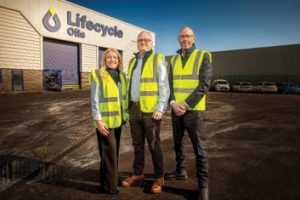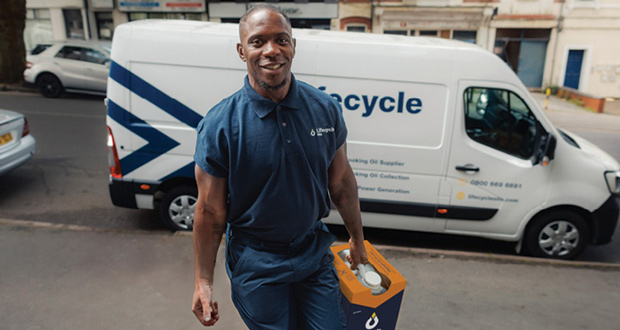From waste stream to sustainable energy. Suzanne McKenzie, Sales Director at Lifecycle Oils on how cooking oil is being transformed into biofuel
The UK’s food industry produces millions of litres of used cooking oil (UCO) every day via food service outlets and food manufacturers. Historically this UCO was treated as a waste product, presenting significant challenges in disposal and compliance. When not properly disposed of, fats, oils and grease (FOG) can lead to severe drain blockages, environmental pollution and hefty fines for businesses under the Water Industry Act 1991.
Yet today, our attitudes towards waste have come full circle, and UCO is now a valuable feedstock for advanced, second-generation biofuels. That is why we buy used cooking oil from the food businesses, turning it into a revenue stream for them.
From a sustainability perspective, there are huge benefits from using UCO to create biofuels. Unlike first-generation biofuels made from virgin crops like palm oil or rapeseed, UCO-derived fuels do not create competition for land that could be used for food production, nor do they drive agricultural expansion, deforestation, or biodiversity loss.
By repurposing a waste stream, we are sidestepping the significant carbon emissions associated with additional agricultural production and land-use change. We’re also not competing with the food chain, which can drive price pressures in the edible oils market.
There are also huge carbon savings when compared to conventional fossil fuels. Biodiesel from UCO produces around 80-90 per cent less carbon than fossil fuel diesel, and 40 per cent less carbon than first-generation biofuels made from virgin feedstocks.
A CLOSED-LOOP SERVICE IN ACTION
At Lifecycle Oils, we run a fully closed-loop service that manages the entire lifecycle of cooking oil, transforming it from a potential liability into a renewable energy resource. This is how the process works.
Sustainable Supply and Management: We begin by supplying the food industry with sustainably sourced fresh cooking oils. We then provide FOG management services to help businesses prevent costly blockages and remain compliant with environmental regulations.
Nationwide Collection: We collect the UCO from a wide network of food manufacturers, foodservice providers, oil aggregators and household waste sites. Our logistics are tailored for the industry, handling a range of containers including 60L barrels, 120L wheelie bins, 1,000L Intermediate Bulk Containers (IBCs) and even oil tankers.
Advanced Biofuel Processing: The collected UCO is transported to a new, state-of-the-art biofuels processing plant in Wednesbury, West Midlands, where it is turned into our own patented LF100 biofuel and other biofuel feedstocks.
Biofuel supply: We then sell the LF100 to UK manufacturers, as well as the entertainment and leisure industry, where it is used in generators to power a wide range of operations. We sell other biofuel feedstocks for further processing into various biofuels, such as Sustainable Aviation Fuel (SAF) and Hydrotreated Vegetable Oil (HVO).
PRODUCING SUSTAINABLE BIOFUELS
To achieve the volumes needed, the Wednesbury facility opened in May 2025. This modern biofuel plant in the Midlands can produce millions of litres of biofuel and biofuel products every week. It’s where LF100 biofuel is produced, a second-generation biofuel designed to be as sustainable as possible, eliminating the chemical treatment stage traditionally required to turn UCO into biofuel. Instead, a multi-stage filtration and extended warm settling process is used, which takes approximately 14 days to complete.
LF100 biofuel can be used directly as a biodiesel in generators. In fact, the entire Wednesbury plant is operated with our own LF100 biofuel, it’s a great example of a truly circular model in action.
A DECARBONISATION OPPORTUNITY FOR ALL MANUFACTURERS
While our biofuel feedstock is sourced from the food industry and household waste sites, the final product can be used by any business with a generator. LF100 is a drop-in replacement for generators, meaning any UK manufacturer can make the switch without costly equipment modifications.
This enables a business in any sector to participate in and benefit from this circular model. By running their operations on LF100, they can reduce their own Scope 1 emissions and contribute to a nationwide effort to convert waste into renewable energy.
SUPPORTING THE UK’S WIDER DECARBONISATION EFFORTS
Beyond individual factory operation and use in the leisure and entertainment industry to power back-up generators, festivals and car charging points, the UCO-derived biofuels are also supporting wider UK decarbonisation efforts.
 In addition to producing LF100, we also turn UCO into a valuable feedstock to make other advanced biofuels, including Hydrotreated Vegetable Oil (HVO) and Sustainable Aviation Fuel (SAF).
In addition to producing LF100, we also turn UCO into a valuable feedstock to make other advanced biofuels, including Hydrotreated Vegetable Oil (HVO) and Sustainable Aviation Fuel (SAF).
These fuels are critical for decarbonising sectors where electrification is not currently feasible, such as parts of the transport industry. The aviation industry is an excellent example of a sector under increasing pressure to decarbonise. With UK SAF mandates legally requiring an increasing blend of SAF in jet fuel, starting at two per cent in 2025 and rising to 10 per cent by 2030, these efforts are enabling the sector to meet these crucial targets.
A CIRCULAR FUTURE
Our mission is to transform a problematic waste stream into valuable, lower-carbon energy feedstocks, growing renewable energy capacity while championing the power and potential of the circular economy.
The journey of UCO from the fryer to fuel is a blueprint for how waste can, and is, fuelling a more sustainable, lower-waste, and circular tomorrow for UK manufacturers.





